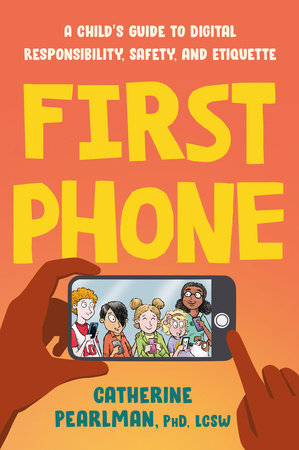4 Things To Do Before Getting Your Child a Phone
by Catherine Pearlman, Ph.D., LCSW
When children inch toward the tween years, there is one question that nearly every child persistently asks: “When can I have a cell phone?” Kids will argue that everyone else has one. They will explain how they need it for school or because they walk home or because—the reason doesn’t matter. There will come a time when your child wants a phone.
Parents dread this question because it feels daunting to prepare a child for the responsibility of a smartphone. There are so many worries. However, careful preparation before obtaining a phone can improve the transition to ownership.
Here are four important actions parents can take to ensure their children are ready when the phone arrives.
Establish guidelines and expectations
When a child opens a brand new exciting long-waited-for phone, it might not be the best time to discuss the rules and expectations. Think carefully about how you want your children to interact with their phones. Will there be screen-free hours? Where will the phone get charged? Is your child ready for social media? Will you have your child’s password? What will happen if the child loses or breaks the phone? What happens if the child uses the phone in school? These are good questions to figure out as a family ahead of time.
Discuss technology use issues and concerns with your children. Come up with a plan together. The clearer a parent is with the expectations and consequences, the easier it is for children to live up to the standards set.
Start digital education long before a smartphone arrives
Very young children regularly use iPads or their parent’s smartphones. Often, the parent is nearby for supervision. That is great when children are very young. However, by the time late elementary school rolls around, most children have friends with a phone. Some of those friends might have access to the internet or social media. So even if your child doesn’t have digital access at home, chances are they have it at school or on a playdate.
Digital education should begin long before a child gets a smartphone. Being safe and competent with digital devices requires a lifelong commitment to learning. Start talking to your children about the concept of a digital footprint. Explain what phishing and scams are. Talk about privacy, consent, protecting information, and how to stay safe online.
If you have weekly conversations about digital education, your child will make better decisions when the time comes.
Foster open communication
Your child will make mistakes with their smartphone. Chances are, they will also struggle with difficult digital decisions, cyberbullying, sexting, or their mental health. If you want your child to feel comfortable talking to you, now is an excellent time to foster open communication.
Talk to your children about various topics and issues. Listen carefully to their point of view. Try not to lecture or tell them what is right. Instead, validate them, show empathy, and be accepting of their opinions even if you disagree. Answer questions without making children feel silly for asking. That way, when the stakes are higher with regard to their smartphone, they will feel secure coming to talk to you.
Be a digital role model
Parents often have high standards for children regarding screen time and technology use. But they can fall short in curtailing their own behavior. Phones aren’t just addicting for kids. They draw us all in. Maybe you answer a text at dinner or mindlessly scroll Facebook when the kids are at the playground. Perhaps you constantly check your phone even while driving.
Children watch the adults around them to see what behavior is acceptable. If grown-ups show poor digital etiquette, lack of social skills, or excessive screen use, it will also become the norm for children. Before your child starts paying attention, work on your digital habits so you can set a good example. It will be much easier to tell your child to put their phone down if you do it, too.
-
First Phone: A Child's Guide to Digital Responsibility, Safety, and Etiquette
Available from:Also available from:

